The Health Benefits of Dried Lily Flowers
Discover the Powerful Dried Lily Flower Benefits for Your Health
Dried lily flowers, also known as dried daylilies, have been used in traditional Chinese medicine for centuries. These delicate flowers are not only beautiful, but they also provide numerous health benefits. In this article, we will explore the many dried lily flower benefits for your health and well-being, including their antioxidant properties, ability to improve skin health, and aid in digestion.
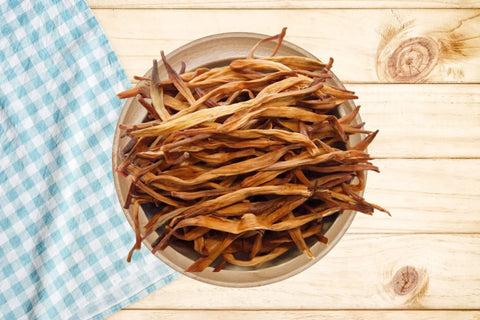
Discover the Powerful Dried Lily Flower Benefits for Your Health
1. What Is Dried Lily Flower?
2. 10 Incredible Dried Lily Flower Benefits You Need to Know
2.1 Improves Digestion
2.2 Promotes Respiratory Health
2.3 Boosts the Immune System
2.4 Enhances Skin Health
2.5 Regulates Blood Pressure
2.6 Promotes Weight Loss
2.7 Aids in Detoxification
2.8 Reduces Inflammation
2.9 Improves Cognitive Function
2.10 Promotes Cardiovascular Health
3. Incorporating Dried Lily Flowers into Your Diet and Lifestyle
4. Possible Side Effects of Consuming Dried Lily Flowers
5. Conclusion
1. What Is Dried Lily Flower?
Dried lily flower, also known as dried daylily or dried golden needles, is a common ingredient in Chinese cuisine and traditional medicine. It is derived from the yellow or orange flower buds of the daylily plant, which are harvested in the early summer months and then dried for preservation.
It has a delicate and slightly sweet flavor, and a chewy texture. It is often used in soups, stews, and stir-fry dishes in Chinese cuisine, as well as in traditional Chinese medicine to promote health and wellness.
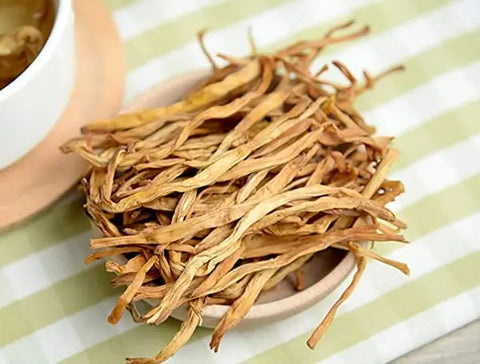
2. 10 Incredible Dried Lily Flower Benefits You Need to Know
From enhancing skin health to boosting the immune system, dried lily flowers offer an array of benefits that you may not be aware of.
2.1 Improves Digestion
They are rich in dietary fiber, which can improve digestive health by regulating bowel movements and preventing constipation. The fiber in dried flowers also promotes the growth of beneficial gut bacteria, which can further enhance digestive function.
2.2 Promotes Respiratory Health
For a considerable amount of time, these dried flowers have been utilized to remedy respiratory conditions like coughs, colds, and bronchitis. The flowers are comprised of organic substances that possess the ability to alleviate inflammation and irritation in the respiratory tract, thereby facilitating easier breathing.[1]
2.3 Boosts the Immune System
Dehydrated lily flowers are abundant in antioxidants like polyphenols and flavonoids, which can shield the body against detrimental free radicals. By reinforcing the immune system, it can help prevent various ailments and disorders.
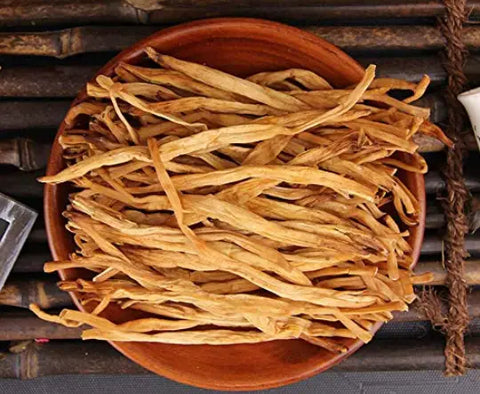
2.4 Enhances Skin Health
Vitamins A and C, both of which are indispensable for maintaining healthy skin, are present in these flowers. These vitamins can aid in diminishing the visibility of wrinkles and fine lines, as well as stimulating collagen synthesis, resulting in smoother, more youthful-looking skin. [2]
2.5 Regulates Blood Pressure
Dried lily flowers contain potassium, which can help to regulate blood pressure by counteracting the effects of sodium. By maintaining healthy blood pressure levels, they can help to reduce the risk of heart disease and stroke.
2.6 Promotes Weight Loss
With low caloric content and a high dietary fiber concentration, dried lily flowers are an excellent food for weight loss. The fiber present in these flowers can help suppress the appetite and induce feelings of satiety, consequently curbing overeating and aiding in weight loss.
2.7 Aids in Detoxification
Natural substances found in dried lily blossoms can aid in detoxification by removing harmful toxins and waste from the body. These flowers can assist the liver and kidneys and enhance general health and well-being.
2.8 Reduces Inflammation
Dehydrated flowers contain natural substances that possess anti-inflammatory properties. These substances can help mitigate the body's inflammation, which has been associated with several illnesses such as cancer, heart disease, and arthritis.
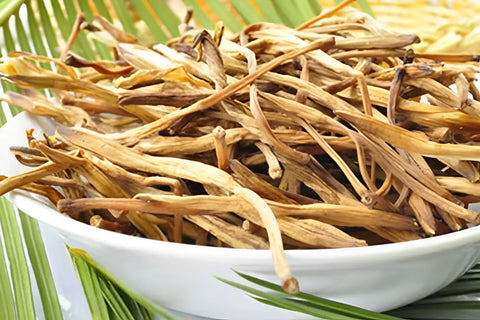
2.9 Improves Cognitive Function
The presence of organic substances in these types of flowers can enhance the performance of the brain by augmenting the blood supply to it. This, in turn, can assist in ameliorating memory and focus, thus promoting the well-being of the brain. [4]
2.10 Promotes Cardiovascular Health
Dried lily flowers contain natural compounds that can help to reduce cholesterol levels and improve blood flow, which can promote cardiovascular health. By reducing the risk of heart disease and stroke, they can support overall heart health.
3. Incorporating Dried Lily Flowers into Your Diet and Lifestyle
Dried lily flowers can be used in various ways, including:
- Making tea: Add 2-3 dried flowers to a cup of boiling water and let steep for 5-10 minutes. You can drink this lily tea plain or add honey, lemon, or other herbs to taste. You can find more recipes here.
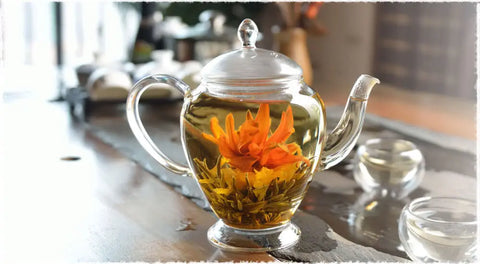
- Cooking: Dried flowers can be added to soups, stews, stir-fries, and other dishes for a delicate, slightly sweet flavor.
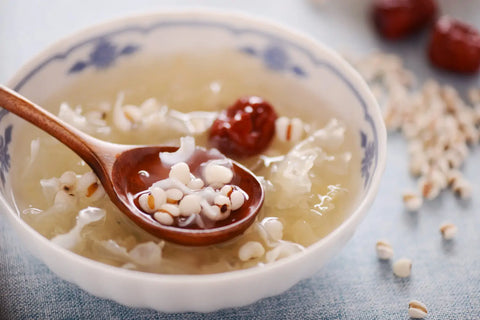
- Baking: They can also be used in baking, such as adding them to bread, cakes, and muffins for a unique flavor and texture.

Before using these types of dried flowers, it's important to soak them in water for at least 30 minutes to soften them and remove any impurities. Once they're ready, you can use them in your favorite recipes or enjoy them as tea.
4. Possible Side Effects of Consuming Dried Lily Flowers
As with any natural remedy or food, it is important to consider the potential side effects before incorporating dried flowers into your diet. While they are generally considered safe to consume, there are a few things to keep in mind.
Allergic reactions: Some people may be allergic to dried flowers, which could result in symptoms such as itching, hives, or difficulty breathing.
Digestive issues: Consuming large amounts of them may cause digestive issues such as bloating, gas, or diarrhea.
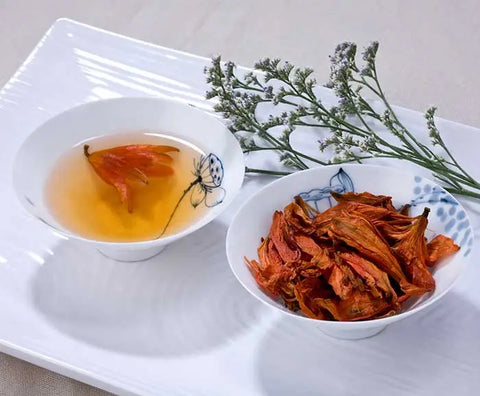
Blood thinning effects: Dried lily flowers may have blood thinning effects, which could be dangerous for individuals taking blood-thinning medications.
Interactions with medications: If you are taking any medications, it is important to speak with your healthcare provider before incorporating them into your diet, as they may interact with certain medications.
Kidney function: Some studies have suggested that these flowers may have a diuretic effect, which could be problematic for individuals with kidney issues.
5. Conclusion
Dried lily flower benefits are numerous and include improved digestion, boosted immunity, and healthier skin. As more people become interested in natural remedies and alternative medicine, they are a promising addition to any wellness routine. The Rike offers high-quality tea that makes it easy to enjoy these benefits as part of a healthy lifestyle. Don't miss out on the chance to experience the incredible benefits of dried flowers - visit The Rike and buy their dried tea today.
FAQ
Rehydrated lily flowers can indeed be stored in the refrigerator, maintaining their quality for a couple of days. To ensure freshness, keep them in an airtight container. Regularly checking their smell is a good way to gauge their freshness. If they have any off odor, it's best to discard them.
Are Dried Lily Flowers Safe for Toddlers to Consume?
When it comes to feeding your toddler new foods, safety is a top priority. Dried lily flowers, a common ingredient in many Asian dishes, can raise questions for parents.
What Are Dried Lily Flowers?
Dried lily flowers, also known as "golden needles," are simply the dried buds of the lily flower. They are commonly used in soups and stir-fries for their unique flavor and texture.
Safety Concerns for Toddlers
-
Choking Hazard: One critical consideration is the potential for choking. Due to their chewy texture, these flowers might pose a choking risk for toddlers. Always ensure they are adequately sliced or processed to reduce this risk.
-
Allergic Reactions: While less common, allergies could be a concern. Introduce a small quantity initially to monitor any adverse reactions such as rashes or gastrointestinal issues.
-
Digestive Ease: Dried flowers can be a bit tough on young digestive systems. Ensure they are well-cooked and softened before serving.
Nutritional Perspective
Though not particularly rich in nutrients, dried lily flowers do provide dietary fiber, which can benefit digestion. However, they should not replace more nutrient-dense foods in your toddler's diet.
Conclusion
While dried lily flowers can be safe for toddlers when prepared correctly, it's crucial to prioritize texture, preparation, and portion size. As with all new foods, close supervision and gradual introduction are key.
Always consult with a pediatrician or a nutrition expert if you're unsure.
Absolutely! The water used to rehydrate dried lily flowers can indeed be a valuable ingredient in your cooking. Here's how you can utilize it effectively:
How to Make the Most of Rehydrating Water
-
Settle and Strain: After rehydrating the flowers, it's important to let the water stand for a while. This allows any remaining solids to naturally settle at the bottom.
-
Repurpose as Stock: Once settled, carefully pour off the clear liquid, leaving the solids behind. This flavorful water can then be employed as a vegetable stock substitute. It's excellent for adding depth to stews, soups, and sauces.
-
Cooking Tips:
- Best Practices: Avoid adding the settled solids to your dishes, as they might contain unwanted textures or debris.
- Storage: If you're not using the stock immediately, consider freezing it in portions for future use.
By following these steps, you can transform what might otherwise be discarded into a nutritious, zero-waste cooking resource.
When you're in the market for dried lily flowers, there are a few key characteristics to consider to ensure you're getting the best quality.
Color: Opt for lily flowers that exhibit a rich, dark hue. This suggests a more intense flavor, which is desirable if you're looking to capture the authentic taste in your dishes.
Stems: Pay attention to the stems. Robust and firm stems are a sign of freshness and better quality, compared to those that are too soft or brittle.
Flavor: Generally, darker lily flowers are associated with a bolder flavor profile, whereas lighter-colored ones tend to be milder, which might not be as preferable for culinary purposes.
For the best selection, visit a Chinese supermarket where you are more likely to find these premium dried lily flowers. Keeping these tips in mind will help you choose the perfect batch for your cooking needs.
Dried lily flowers can be used in various ways, including:
-
Making tea: Add 2-3 dried flowers to a cup of boiling water and let steep for 5-10 minutes. You can drink this lily tea plain or add honey, lemon, or other herbs to taste. You can find more recipes here.
-
Cooking: Dried flowers can be added to soups, stews, stir-fries, and other dishes for a delicate, slightly sweet flavor.
-
Baking: They can also be used in baking, such as adding them to bread, cakes, and muffins for a unique flavor and texture.
Before using these types of dried flowers, it's important to soak them in water for at least 30 minutes to soften them and remove any impurities. Once they're ready, you can use them in your favorite recipes or enjoy them as tea.
Preparing Dried Lily Flowers for Cooking
To properly prepare dried lily flowers for cooking, follow these steps:
-
Rinse: Gently rinse the dried flowers with tap water to wash off any dirt.
-
Rehydrate: Bring a pot of water to a boil. Place the lily flowers in a large bowl and pour the boiling water over them, using 2 to 3 cups of water for a handful of flowers.
-
Soak: Let the flowers sit for about 2 hours until they become very soft. This step is crucial to avoid a chewy texture in your dishes.
-
Drain and Reserve: Drain the flowers, saving the rehydrating water. This liquid can serve as a flavorful vegetable stock for soups or stews.
-
Trim and Slice: Use your hands to snip off the tough ends and cut the flowers in half lengthwise, making them ready to add to your culinary creations.
By following these preparation steps, you can enhance the flavor and texture of your dishes, whether you're brewing a soothing cup of tea or incorporating the flowers into a savory or sweet recipe.
Dried lily flower, also known as dried daylily or dried golden needles, is a common ingredient in Chinese cuisine and traditional medicine. It is derived from the yellow or orange flower buds of the daylily plant, which are harvested in the early summer months and then dried for preservation.
These dried flowers have a brownish yellow color and resemble straw in shape and texture, offering a clear visual cue. They exude a strong and special woody, earthy aroma, enhancing their presence in any dish.
With a delicate and slightly sweet flavor, and a chewy texture, dried lily flowers are often used in soups, stews, and stir-fry dishes in Chinese cuisine. Additionally, they are valued in traditional Chinese medicine for their health-promoting properties.
Dried lily flower benefits are numerous and include improved digestion, boosted immunity, and healthier skin. As more people become interested in natural remedies and alternative medicine, they are a promising addition to any wellness routine.
To experience these benefits firsthand, you can start by purchasing dried lily flowers at a Chinese supermarket. Look for flowers that have a darker color and stronger stems, as these tend to have a more robust flavor. Avoid the lighter-colored ones, which often have a milder taste.
For a convenient option, consider high-quality dried lily flower tea, which makes it easy to incorporate these benefits into a healthy lifestyle. Don't miss out on the chance to experience the incredible benefits of dried flowers—visit your local store or check online retailers today to make your purchase.





Leave a comment